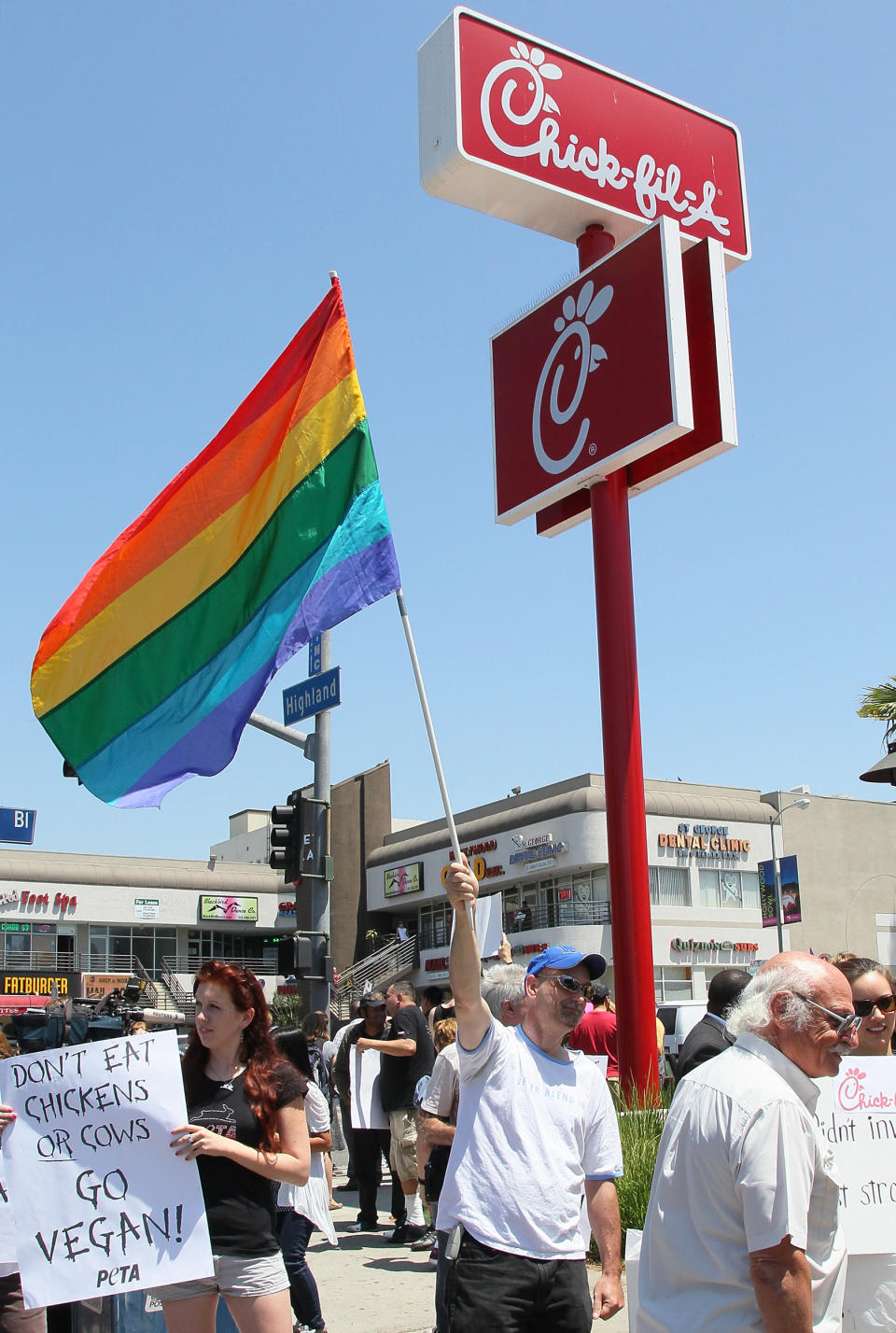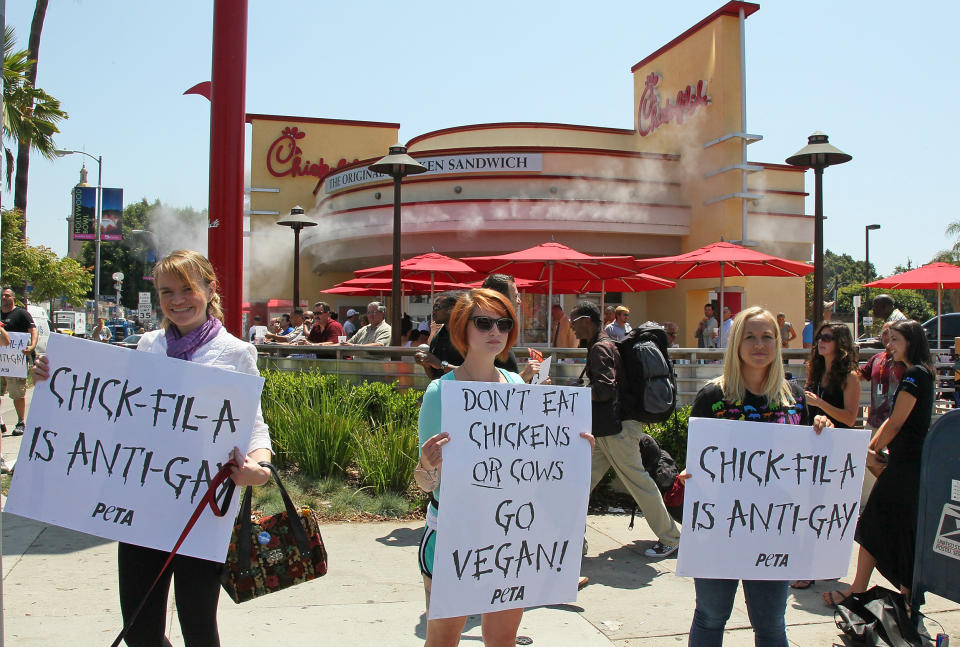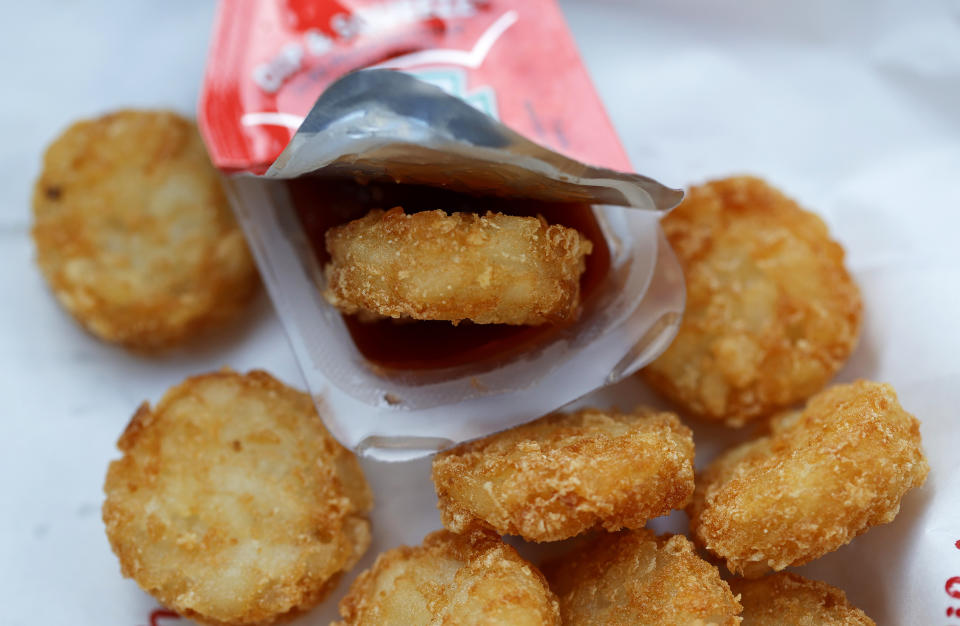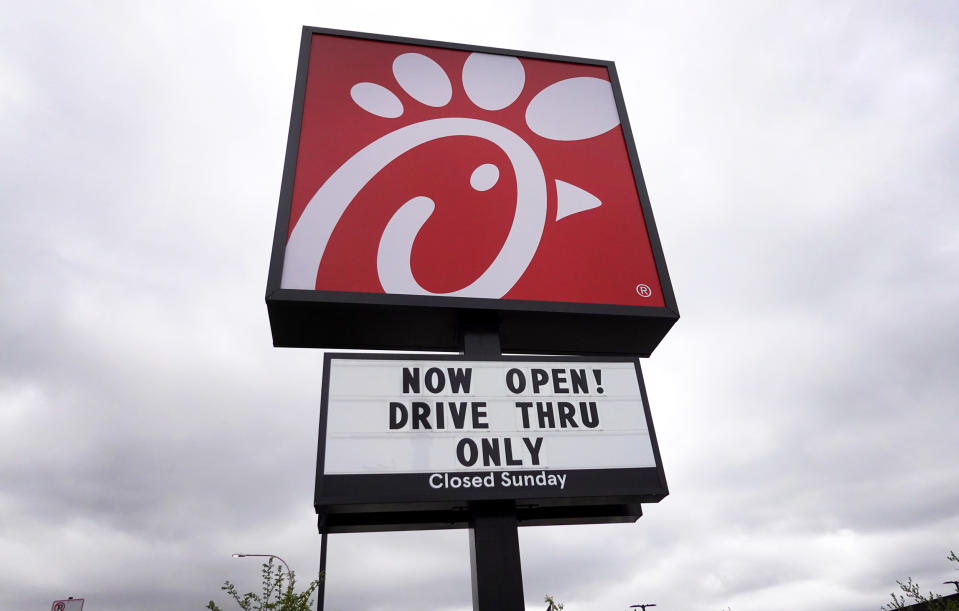I’m gay and I eat at Chick-fil-A. Should I feel ashamed?
- Oops!Something went wrong.Please try again later.
John remembers going to Chick-fil-A in college often.
“I went to film school in Savannah, Georgia, and this is going to sound awful, but I was eating it almost every day,” John, who asked that we only use his first name to protect his identity, tells TODAY.com. “I was obsessed. There are lots of gays at the school I went to and it would be a common thing where I would notice other gays going incognito to Chick-fil-A, trying to get their fix.”
John, a 26-year-old gay man who lives and works in the New York City area, says he also used to eat there as undercover as possible. This is due to Chick-fil-A’s well-documented history of donations to charities with anti-LGBTQ+ stances, as well as current chairman Dan Cathy’s controversial commentary on same-sex marriage.
“I would be in, like, sunglasses and a hat,” John says. “Unintentionally but subconsciously, I was trying to not be seen by the other gays that might be in the area watching me pull into the drive-thru. I definitely do think that there was some subconscious shame, but now it’s very conscious.”
Around the start of the pandemic, John says he had a change of heart, a year after the Chick-fil-A Foundation said it would donate only to organizations that work exclusively in education, homelessness and hunger, and would no longer be giving to charities that take anti-LGBTQ+ stances after facing backlash.
“I mean, things should have been this way all along where we’re being more culturally conscious,” John says, adding that he realized that eating fast food all the time wasn’t too good for him, either. “I still get those urges, though, like, ‘Oh, my God, Chick-fil-A’s on DoorDash. I got the money, I want to do it,’ but I just haven’t.”
And John is far from alone.
“The first Chick-fil-A that opened in New York, my friends, and I actually stood in line to eat on opening day,” Megan, who also asked that we only use her first name to protect her identity, tells TODAY.com. Megan, a 33-year-old lesbian woman, now lives Oakland, California, but she lived in New York City for a decade. “And you know, while we’re doing this, there were protesters yelling at us across the street holding signs and stuff.”

At the time of that Manhattan location’s opening on the corner of 37th and 6th in 2015, there were vegan and LGBTQ+ protesters out front protesting the arrival of the chicken chain. And then, born-again Christians came to heckle the protesters themselves.
“Certainly I understand that it’s a really controversial topic,” Megan says. “I don’t know if I would proudly say that I eat Chick-fil-A as a queer person.”
I am a 40-year-old gay Black man who for large swaths of his life cared about how others perceived him. Thankfully, I don’t care so much anymore, living out and proud (and weird) no matter where I am. That is, until I found myself going to Chick-fil-A for the first time ever, at the start of Pride Month, no less.
My curiosity got the best of me. As I waited for my order in the store, I wondered if my outfit made me look gay for the first time in years. And no, the chicken was not worth that feeling.
John, Megan and I are only three examples of a phenomenon that has simmered under the surface of queer culture for some time now. Gays: Sometimes we eat at Chick-fil-A.
tb to when i ate chick-fil-a on the first day of pride month.. i cant even be mad at myself that shit was so good
— ^_−☆ (@wondastars) June 10, 2022
On social media, posts about this taboo take particular hold during Pride Month, when shame is supposed to be banished in favor of celebration. But Chick-fil-A is only closed on Sundays — not all June long.
why me and my friends going to pride today and she stopping at chick-fil-a first like omg i literally did this last year too........
— zae (@itszaeok) June 3, 2023
Of course, for some members of the LGBTQ+ community and our allies, eating at Chick-fil-A is the ultimate transgression against our coterie — and when you look at some of the evidence, for a gay person, it’s hard to argue with.
Reminder if you ate at any Chick-Fil-a in the last year you are excluded from pride by default, but will be punished during wrath month next month💅🏽
— 🥶🍕 (@coldpizza93) June 1, 2023
Chick-fil-A's controversial history
It all started in 2010, when the WinShape Foundation, a charitable endeavor of Chick-fil-A founder S. Truett Cathy and his family, stated that it would not allow same-sex couples to participate in its marriage retreats. The foundation’s website’s “Marriage Retreats” page explains that its experiences “help husbands and wives.”
When Chick-fil-A gave over $8 million to the foundation in 2010, WinShape then donated $2 million of the funds it received from Chick-fil-A to seven anti-LGBTQ+ groups, including The Family Research Council, an organization listed as an “anti-gay hate group” by the Southern Poverty Law Center.
This went on for years, including in 2012 when Dan Cathy said that America was “inviting God’s judgment” for entertaining the idea of same-sex marriage and later said “guilty as charged” when asked if he thought marriage equality should not exist.
Since then, Cathy has openly voiced his anti-LGBTQ+ opinions and personally donated to anti-LGBTQ+ groups.

All of this has caused intermittent backlash, like the protests at aforementioned New York location, but also in Chicago, Illinois and, more recently, Toronto, Canada, in 2018 and 2019, where people took to the streets and social media to protest the chain’s planned expansion into the city. The chain has since expanded to five locations in Ontario's capital city.
Students at several colleges and universities also tried to ban the company’s restaurants from their campuses, including Northeastern and Davidson College, which succeeded, and NYU, which ultimately voted to keep chicken on the curriculum, so to speak.
Several articles, think pieces and tweets later, Chick-fil-A’s charitable foundation said it halted its donations to three groups against gay marriage in 2019, including the Salvation Army and the Fellowship of Christian Athletes.
This is even as Cathy has continued to donate (from his personal funds) as recently as 2021 to organizations accused of funding opposition to The Equality Act, which would expand civil protections for LGBTQ+ people. The National Christian Charitable Foundation (NCF) has identified Cathy as one of its “high-dollar donors.”
On the other side of the coin, there has been recent controversy over Chick-fil-A’s VP of diversity, equity and inclusion, a position that has existed in the company since July 2021. Conservatives on social media called for a boycott of the chicken chain over the position’s existence, with one person tweeting, “everything good must come to an end.”
Chick-fil-A declined to comment on the record for this story.
So why would a queer person ever decide to eat there?
“I have a joke in my standup that is, ‘Gay people got me hired at Chick-fil-A and that’s how I started working there,” Ryan Leach, 31, a gay comedian and former Chick-fil-A employee tells TODAY.com. “There was a small group of us in my hometown, we all knew each other was gay and one of them worked at Chick-fil-A and got the rest of us hired.”
Leach says his teen years were spent working in fast food, remarking that he has positive and funny memories associated with working at the chicken chain. So many, in fact, that he’s made it part of his act.
“One thing that I’m not really proud of that I did when I lived in Virginia and I was growing up was I worked at Chick-fil-A for three years. A lot of gay people get mad at me about that,” Leach says in a standup routine he posted on Instagram.
“They’re like, ‘What kind of self-respecting gay person would ever work at Chick-fil-A?’” he continues. “To which I would say, ‘Well, I’ve never met a self-respecting gay person, but if I did, they probably wouldn’t work at Chick-fil-A.”
Leach says that growing up poor in a Southern community limited employment options for queer folks, and while he says in his routine that he was “not really proud” of working at the chain, the reality of how he feels about the Chick-fil-A taboo is a little more complicated.
“A lot of us are growing up in very Christian towns and we are the ones who are the most familiar with the infrastructure of evangelical violence in the world, so you don’t need to tell us about it,” Leach says. “When you’re telling us that Chick-fil-A is bad, it’s like, well, we know more about it than you.”
Leach also says that the money he earned working at the chain helped him go to college and eventually move to New York, where he now lives.
“It seems sort of condescending and shallow because no one can school you on the violence of evangelical Christianity better than a gay who was working at Chick-fil-A, because it was mild compared to the things that we were exposed to as children.”

“It seems like boycotting Chick-fil-A is a very … like, white, liberal, ‘I’m going to do this thing that doesn’t actually inconvenience me because I never did it anyways’ kind of thing,” Leach continues. “If everyone were to stop eating at Chick-fil-A, who would it hurt the most? It’s not going to hurt wealthy white evangelicals — it’s going to hurt the people who work at Chick-fil-A.”
Leach still eats at Chick-fil-A, but since there are only a handful of them in New York, it’s not as often as when he worked there.
“There’s a lot of places I could feel shame working at other than Chick-fil-A,” Leach says before listing a laundry list of defense contractors, investment firms and weapons manufacturers that he would be less proud of being on his resume. “In reality, being gay at Chick-fil-A was one of the funniest things I’ve ever done.”
How should queer people feel when they eat at Chick-fil-A?
“I often hear from clients (and people in general) that they ‘should’ be doing/feeling/believing something, and whenever I hear the word ‘should,’ I ask, ‘According to who?’” Dr. Dulcinea Alex Pitagora, a NYC-based psychotherapist and sex therapist, tells TODAY.com.
Dr. Pitagora (who uses they/them pronouns) often deals with queer patients and the shame they experience in their practice, approaching conversations with clients in a neutral, nonjudgmental way, encouraging them to think about where the belief comes from and whether or not it aligns with their values. Then, they can make a decision for how they want to act based on their own internal values.
“In order to do this kind of introspection, it’s necessary to be aware of what your values actually are, so sometimes the conversation turns into an exploration of what someone’s values are,” Dr. Pitagora says. “There can also be internally conflicting values, in which case prioritization and contextualization of conflicting values comes into play.”
Chris, a gay 32-year-old who also asked that we only use his first name to protect his identity, says he’s arrived at that decision for himself: He doesn’t feel ashamed for eating at Chick-fil-A.
“If they had poor animal rights history, I would feel shame,” Chris tells TODAY.com. “Just for me to get through some of the stigma or the discrimination or the bullying that I encountered as a young boy, it’s been really important to not feel ashamed. I don’t know if it’s willful denial, or if it’s really just intrinsic to who I am.”
With so many chicken options out there, it’s so easy not to eat at Chick-fil-A. Why do people still do it?
“While not eating somewhere does seem like an easy choice to make, it’s not an easy choice for everyone,” Dr. Pitagora says. “Sometimes people cut corners on choices because that’s all they have the (mental, financial, etc.) capacity for in that moment, or they have other reasons for their choice that need to be prioritized in that moment. Sometimes the best choice isn’t available to make, so we end up making a least-worst choice. For example, eating something rather than eating nothing.”

Dr. Pitagora says another reason someone might feel conflicted about eating at Chick-fil-A but still end up eating there is that they have some attachment to the location, the atmosphere or the food itself which ends up being prioritized over a decision to partake in this particular brand of activism.
“Still, other people react in the opposite way — that they feel they ‘should’ because they don’t want to be told what to do, even if it’s by members of their community for what may be a good reason,” says Dr. Pitagora.
‘Shame thrives off of silence’
As you may have noticed, almost every single queer person that spoke with me for this article agreed to under the condition of shielding their identity. Their reasons for this may be slightly different, but the common denominator was a fear of the wrath of every gay person on the internet.
I'll admit, for this same reason, part of me wanted to be the anonymous author of this article.
“We’re in the middle of a very dangerous time for the queer community, where our safety and autonomy is being threatened because of a political climate that intensifies the closer it gets to the 2024 presidential election,” Dr. Pitagora says. “It’s scary to do nothing about it, and it’s scary to do something about it.”
But, Dr. Pitagora says, “Shame thrives off of silence, and the more we’re silent, the more shame makes us be silent. It’s a dangerous loop and efforts must be made whenever possible to interrupt it.”
“If you have the energy, it’s always better to talk about taboo issues, even if we’re not proud of what we’re saying, otherwise we’re reinforcing shame by default,” they add. “Talking about things we’re ashamed of is the only way to examine our motivations and capacity for change.”
‘We're doing the best we can’
Dr. Pitagora says that sometimes we have to conserve our energy by feeding ourselves with food that might not be the best for us either physically, socially or psychologically, in order to have the strength to get through the day. To feel shame is natural, but so is doing what you have to do to make it through the day.

“Because things feel so intense so often due to forces outside the community that feel beyond our control, this can cause infighting within the community between those who feel more should be done by those they decide aren’t doing enough,” Dr. Pitagora says.
“My hope is that we can all have grace and be generous and compassionate with each other, and realize that we’re all probably doing the best we can, and it’s never going to be enough because we just can’t do it all,” they add. “People outside the community (for example, straight people, Chick-fil-A and others) need to be doing more for the queer community, actually.”
As Megan said, she doesn't know if she would say she was proud to eat at Chick-fil-A — but does she feel ashamed?
“No, I don’t,” she says, emphatically. “There’s bigger freaking fish to fry, guys.”
This article was originally published on TODAY.com

